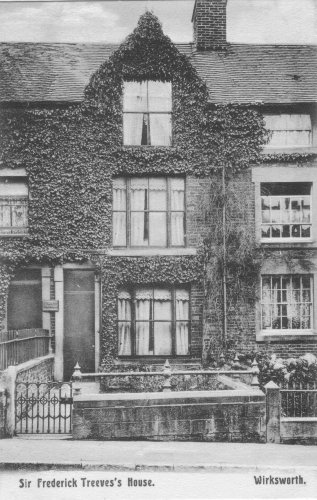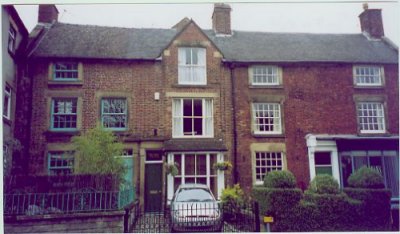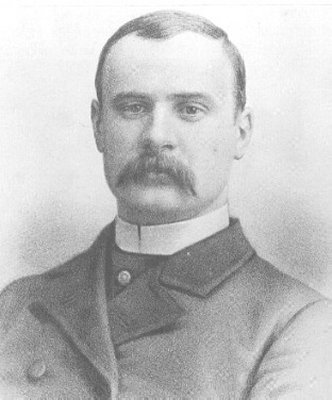Photo taken 1910?

Photo taken 2003.

Sir Frederick Treves.

From a Boy's Book
'Don't worry about genius and don't worry about not being clever.
Trust rather to hard work, perseverance, and determination. The
best motto for a long march is "Don't grumble. Plug on." |
Wirksworth, Sir Frederick Treves House
From an unused postcard. The house is on Coldwell Street, Wirksworth.
between numbers 19 and 23. Today it is called just "Treves House", and has
lost its ivy and garden wall. A high-resolution scan shows an
"A T Green, Dental Surgeon" worked at this house when the photo was taken.
Sir Frederick Treves 1853-1923 was born in Dorset and died in Switzerland. He was Surgeon Royal, and operated on King Edward VII and the "Elephant Man". He wrote "Highways and Byways of Dorset". The full and fascinating story of Sir Frederick is told in an article by Peter Seddon.
Pat Craft writes
Treves House is in Coldwell Street, the street on which the Station stands.
Turn right at the Red Lion as if you were going to the Station, pass the
Red Lion, the Vaults and May's tea shop and Treve's House is the next but
one house i.e. next to Ian's hairdresser's on the corner with North End.
Peter Seddon writes:
Hi John,
What a marvellous site you have put together, which has helped with my
Peel connections no end.
I came across the photo of Treves House and you say 'the connection to
Frederick Treves is unknown.'
Well, before he became a 'famous surgeon' etc. Treves practised in
Wirksworth from that property. He arrived when aged 24 in 1878, having
bought a share in the practice of
Dr. William Milligan of Wirksworth. Treves
was young, go-ahead, and with his own ideas, and some of his methods caused
consternation in the town. After a series of controversies he and his wife
Anne (Mason) left Wirksworth in 1879 after barely a year there. Treves went
on to great things and the property at 21 Coldwell Street was named in his
honour. The full story is told in my article in the June 2002 issue of
'Derbyshire Life and Countryside.'
Hope this helps.
Just two snippets of possible interest I came across:
1) Treves's first daughter, Enid Margery Treves, was born in Wirksworth
in 1878.
2) In his book of semi autobiographical short stories - 'The Elephant Man and
Other Reminiscences' - there is one set in 'a small northern town with its own
cottage hospital' - about a doctor who had just got married etc etc - although
Wirksworth is not mentioned by name, the story evidently refers to Treves's
time there. In fact, many of the stories are about 'a young medical man who
had started practice in a humble country town'....all drawing on his
Wirksworth experience.
Peter Seddon.
Noreen Reeves writes:
Dear Mr Palmer,
During my research into the Ogdon family of Wirksworth, I have been using
your great website nearly every day !! It has been an enormous help to me,
especially as I can get more up to date with the 1901 Census results.
Keep up the good work!! I notice that you have :
Photo 186 - Treves House, Coldwell Street , Wirksworth.
As you request any relevant info regarding this photo, I wondered whether the following details might be of interest to you?
CATHERINE MARSDEN [JOHNSON, TATLOW nee OGDON]
wife of William Wesley MARSDEN
died 1930 Jan 5 [77]
Treves House
Will - probate London 1930 Feb 25 - to the said
William Wesley MARSDEN, retired tin man
John William W MARSDEN, accountant
J ONIONS manager
Effects - £588 7s 6d
WILLIAM WESLEY MARSDEN
widower of above
died 1932 Nov22[79]
Treves House
Will - probate London 1933 Jun 1 - to the said
John Edward TATLOW, engineer
John William WESLEY, accountant
Alice Ann Marsden, spinster
Effects - £4,583 11s 11d
CENSUS 1901 - Market Place, Wirksworth
William Wesley MARSDEN 47 ironmonger
Catherine MARSDEN wife 48
Alice Ann MARSDEN dau 23
Ann Maria MARSDEN dau 22
Daniel Roper MARSDEN son 19 ironmonger's assist
Mary JOHNSON step dau 23
Harry JOHNSON step son 21 grocer's assist
Kate JOHNSON step dau 20
Evelyn JOHNSON step dau 18
You have two photos of this family 's hardware stall on your site.
[Yes, these are 017 and 018]
Another bit of info might interest you :
CENSUS 1901 St John St Wirksworth
Eliza OGDON wid 44 boarding house keeper
Edward PALMER boarder 16 domestic postman Bury St Edmunds
Any relation to you??
[Regret no, my PALMERs come from Northants]
The 2003 photo was taken for me by my researcher in Wirksworth, Kate Henderson. She also provided me with the details regarding the wills. The census details are from you.
Best wishes,
Noreen Reeves [Mrs]
Dates:
Photo taken: 1910?
Size: Postcard
Source: Internet
Click on photo for enlargement (on CD only)
Have any more information about this photo?
Please e-mail the author on:

